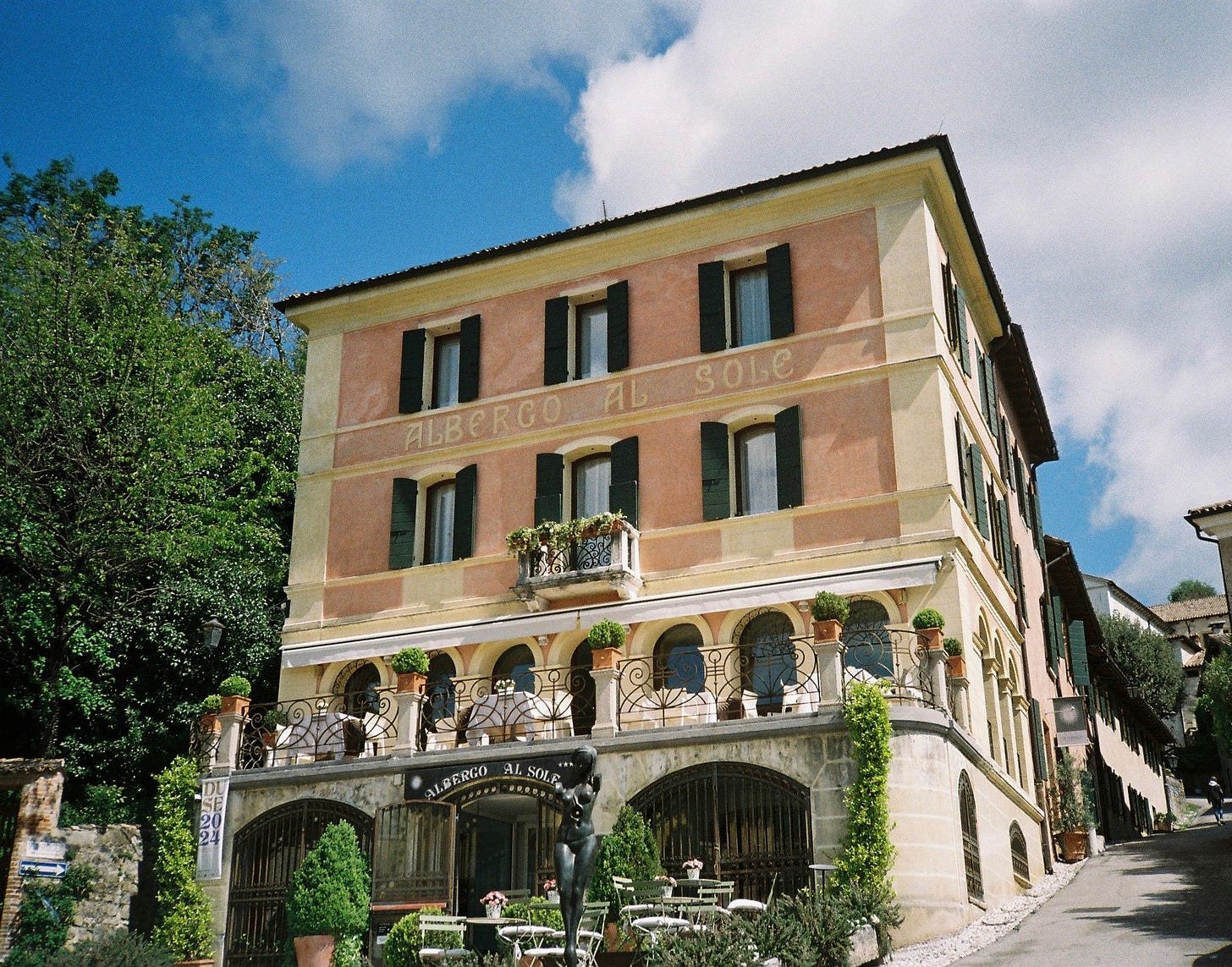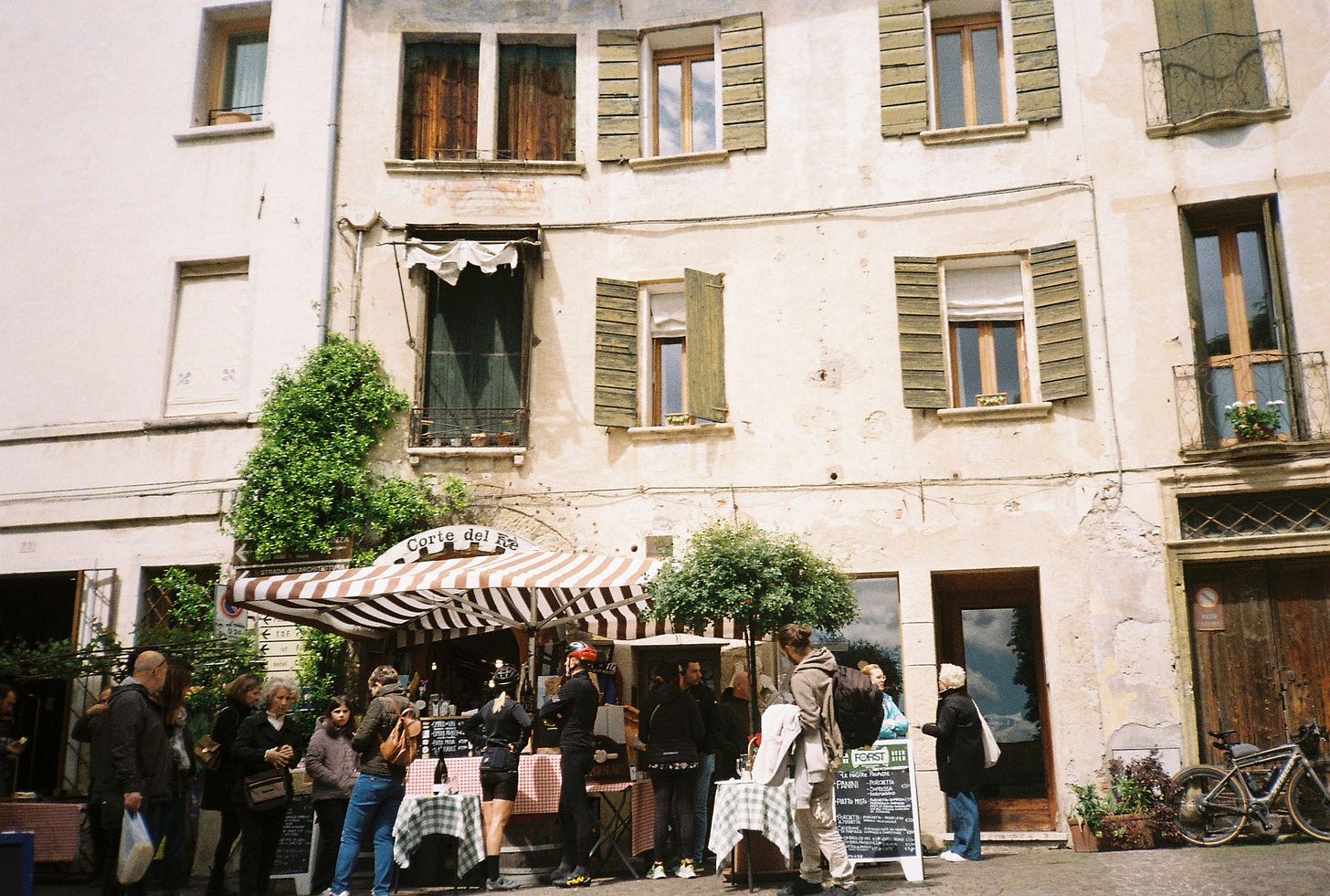Asolo: Refuge of the Mind
Defined by Italian poet Giosuè Carducci as “the city of a thousand horizons”, Asolo is a quaint hilltop hamlet in Veneto, recognized as one of Italy's most beautiful. Its history extends back to Roman times when it was known as Acelum, flourishing particularly during the Middle Ages under the reign of Caterina Cornaro, the exiled Queen of Cyprus. She transformed Asolo into a vibrant Renaissance court that attracted artists and literati, setting the stage for centuries of cultural richness. The town’s 12th-century Rocca, a grand fortress, stands as a testament to its past, offering panoramic views that span across the serene valleys to Valdobbiadene, the heartland of Prosecco, located just 20km away.
The town itself is a little gem, encapsulating the passage of time within its ancient walls and medieval structures. From the bustling Piazza Maggiore to the tranquil paths leading up to the Rocca and the historical center, touring the Castello is a journey through history.
Walking through Asolo is like traversing a living museum, adorned with elements that narrate tales of its illustrious past and the notable figures who found solace and inspiration here. Asolo has welcomed thinkers, literates, philosophers, travelers, politicians, jet-setters, and the international elite. Henry James, Carlo Scarpa, Filippo De Pisis, Igor Strawinsky, Ernest Hemingway, Eleonora Duse, Robert Browning, and Princess Margaret are just a few of the illustrious personalities that passed through. What these personalities found here was not just history, allure, and beauty – both natural and architectural – but also a quiet retreat to just be and create. A place where like-minded people came to hide; a chance for harmony and for a higher form of connection. Each left their imprint, drawn by the town’s serene beauty and the intellectual stimulation it provided.
Among the myriad of intellectuals and creatives drawn to Asolo, Freya Stark stands out as one of the most fascinating to me. An audacious explorer and a pioneering figure in travel writing, Stark was renowned for her extensive solo journeys across the Middle East and Asia at a time when such feats were rare, especially for women. Her profound love for Asolo served as her sanctuary amidst her daring adventures. Her residence, Villa Freya, built on the old Roman forum, is an embodiment of her spirit. Stark’s efforts during World War II to protect Asolo through her correspondence with Churchill highlight her deep connection and commitment to this enchanting town. I will write a post just on her fascinating life.
Indeed, Asolo's influence extends beyond its cultural allure. You might have noticed, even while strolling around Central London, in the shop windows of stores like Cotswold Outdoor or in one of the many climbing centers, the footwear brand Scarpa. Well, it's from Asolo, where it was founded in 1938. In fact, "Scarpa" stands for Società Calzaturieri Asolani Riuniti Pedemontana Anonima, and over the decades, Scarpa has evolved into a global leader in outdoor footwear, renowned for crafting high-quality hiking boots, climbing shoes, and mountaineering boots. It's extraordinary to think that a global brand could have roots in such a place. This is just one of the many fascinating stories of the Italian entrepreneurial fabric that deserves to be told. There's an interesting story about another company from this territory that is worth mentioning, but I'll keep it for another article since it deserves a deep dive.
Asolo exemplifies the concept of ‘asolare’, a term brought to literary prominence by Browning:
“Asolare: to disport in the open air, amuse oneself at random.”
This word permeates Asolo’s atmosphere; it’s a place to wander aimlessly, to soak in the laid-back, casually elegant lifestyle that the town embodies so effortlessly. It encourages visitors to slow down, absorb the tranquil ambiance, and revel in the unhurried pace of life.








